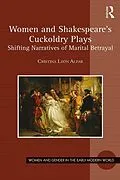How does a woman become a whore? What are the discursive dynamics making a woman a whore? And, more importantly, what are the discursive mechanics of unmaking? In Women and Shakespeare's Cuckoldry Plays: Shifting Narratives of Marital Betrayal, Cristina León Alfar pursues these questions to tease out familiar cultural stories about female sexuality that recur in the form of a slander narrative throughout William Shakespeare's work. She argues that the plays stage a structure of accusation and defense that unravels the authority of husbands to make and unmake wives. While men's accusations are built on a foundation of political, religious, legal, and domestic discourses about men's superiority to, and rule over, women, whose weaker natures render them perpetually suspect, women's bonds with other women animate defenses of virtue and obedience, fidelity and love, work loose the fabric of patrilineal power that undergirds masculine privileges in marriage, and signify a discursive shift that constitutes the site of agency within a system of oppression that ought to prohibit such agency. That women's agency in the early modern period must be tied to the formations of power that officially demand their subjection need not undermine their acts. In what Alfar calls Shakespeare's cuckoldry plays, women's rhetoric of defense is both subject to the discourse of sexual honor and finds a ground on which to "shift it" as women take control of and replace sexual slander with their own narratives of marital betrayal.
Autorentext
Cristina León Alfar is Professor of Shakespeare, Early Modern English drama, and Women's and Gender Studies at Hunter College, CUNY. Her first book, Fantasies of Female Evil: The Dynamics of Gender and Power in Shakespearean Tragedy, was published by the U of Delaware P in 2003. Her third book, Reading Mistress Elizabeth Bourne: Marriage, Separation, and Legal Controversies, edited with Emily G. Sherwood, documents Mistress Bourne's petition for divorce, its resolution, and ongoing disputes (forthcoming from Routledge 2021). She is co-editor, with Helen Ostovich, of the series "Late Tudor and Stuart Drama: Gender, Performance, and Material Culture" for MIP. Currently, she is at work on women parrhesiasts in early modern English drama.
Inhalt
CONTENTS
Acknowledgments
Introduction: Neither Silent nor Obedient: Women and Shakespeare's Cuckoldry Plays
Chapter One: Early Modern Women's Narratives of Marital Betrayal
Chapter Two: 'A woman of quick sense': Women's Agency in Troilus and Cressida and The Merry Wives of Windsor
Chapter Three: 'Manhood is melted into curtsies': Shifting Masculine Honor in Much Ado about Nothing
Chapter Four: 'An essence that's not seen' or 'an odious damned lie': The Ethics of Competing Narratives in Othello
Chapter Five: 'Paper bullets of the brain': Revising the Cuckoldry Play in The Winter's Tale and Cymbeline
Post Script
Index
